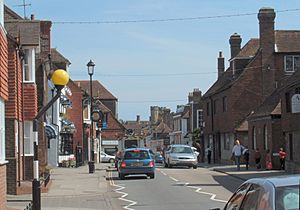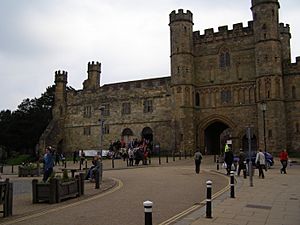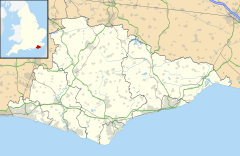Battle, East Sussex facts for kids
Quick facts for kids Battle |
|
|---|---|
 View along the High Street towards the abbey |
|
| Area | 31.8 km2 (12.3 sq mi) |
| Population | 6,800 (2021) |
| • Density | 503/sq mi (194/km2) |
| OS grid reference | TQ747160 |
| • London | 48 miles (77 km) NNW |
| District |
|
| Shire county | |
| Region | |
| Country | England |
| Sovereign state | United Kingdom |
| Post town | BATTLE |
| Postcode district | TN33 |
| Dialling code | 01424 |
| Police | Sussex |
| Fire | East Sussex |
| Ambulance | South East Coast |
| EU Parliament | South East England |
| UK Parliament |
|
| Website | Town Council |
Battle is a town and civil parish in East Sussex, England. It is about 50 miles (80 km) south-east of London. The town is famous because it is built on the site of the Battle of Hastings. This important battle happened in 1066. In this battle, William the Conqueror, Duke of Normandy, defeated King Harold II. After this, William became the King of England. The town was named "Battle" because of this historic event.
Contents
History of Battle
How Battle Began
Before 1066, the area where Battle now stands was mostly empty. The town of Battle grew up around an abbey. King William ordered this abbey to be built. It was a way to remember the Battle of Hastings and to make up for the many lives lost. A small town probably started to form outside the abbey gates by 1110. The abbey helped the town grow by bringing in trade. You can still see some beautiful old buildings from the Middle Ages in Battle today.
Gunpowder and Inventions
For a long time, the area around Battle was covered in thick forests. These forests provided wood for building ships and making cannons. Later, Battle became known for making high-quality gunpowder. The first gunpowder mill in Battle was built in 1676. There was a gunpowder factory on Powdermill Lane. The remains of this factory have now been turned into a hotel.
In 1722, a writer named Daniel Defoe said that Battle was "remarkable for making the finest gun-powder." However, there were many accidents. In 1798, more than 15 tons of gunpowder exploded! Because of these dangers, the gunpowder works were finally closed in 1874.
Battle was also known for its skilled clockmakers. They even developed the first electric clock.
Famous People and Events
Eliza Acton was born in Battle in 1799. She was a famous author who wrote a very important cookbook called Modern Cookery for Private Families (1845). This book was very popular and influenced other famous cookbooks.
The 'Battel Bonfire Boyes' group is one of the oldest Sussex Bonfire Societies. They are known for having the oldest effigy (a model) of Guy Fawkes. You can see it in the Battle Museum.
During World War 2, Battle was mostly safe from conflict. However, some bombs did fall on the town. On February 2, 1943, one bomb exploded, destroying two shops and sadly killing two people. You can still see some "dragon's teeth" near the church. These are concrete obstacles built during the war to stop enemy tanks.
How Battle is Governed
Battle has different levels of local government. This helps to manage the town and its services.
Town Council
The lowest level is the Battle Town Council. It has 13 elected councillors. They meet once a month. This council looks after things like street lighting, parks, and cemeteries. They also speak for the town to the larger district and county councils. Battle is divided into four areas for the council: Marley, Netherfield, Telham, and Watch Oak.
District Council
The next level is the Rother District Council. This council provides services like collecting rubbish, approving building plans, and managing leisure facilities. Battle is part of two wards (areas) within Rother District.
County Council
The third level is the East Sussex County Council. This council handles bigger services. These include education, children's services, road maintenance, and libraries. Battle is part of the Battle and Crowhurst Division for the County Council.
Parliamentary Representation
Battle is part of the Bexhill and Battle area for the UK Parliament. This area elects one Member of Parliament (MP) to represent them in Westminster.
Landmarks in Battle

Telham Hill
Telham Hill is about 1 mile (1.6 km) south-east of Senlac Hill. This is where William the Conqueror first saw the English army. They were getting ready for the Battle of Hastings on October 14, 1066.
Battle Abbey
The Abbey in Battle is called Battle Abbey. It was built to remember the Battle of Hastings. It was officially opened in 1095. The high altar of the abbey church is said to be exactly where King Harold died. The main gatehouse of the abbey is a very noticeable building at the end of the High Street. Many of the original abbey buildings are now gone or have been changed into homes. Some parts of the abbey are now used by Battle Abbey School.
St Mary the Virgin Church
Across from the Abbey is the church of St Mary the Virgin. It was first opened in 1115. The church has beautiful old wall paintings from the 14th century. It also has a stained glass window called the 'Senlac window'. This window shows the Battle of Hastings. The church also displays the Battle Tapestry. This long tapestry is like the Bayeux Tapestry. It shows how the town might have grown from 1066 to 1115. Over 700 people helped to create it!
Battle High Street
Battle is well-known for its charming High Street. It has many traditional shops and places to eat.
Natural Sites
There are three special natural areas in the parish of Battle:
- Blackhorse Quarry: This site is important for fossils. Many fossil bones and teeth have been found here. These include bones from Iguanodon and crocodiles.
- Hemingfold Meadow: This meadow has rare types of grassland plants.
- Darwell Wood: This is an important woodland area. It has many hornbeam trees and oaks.
Transport in Battle
Battle is connected to Hastings and London by the A2100 and A21 roads.
Battle railway station is on the Hastings Line. It is managed by Southeastern. The station building is a great example of Victorian Gothic architecture. It is considered a historic building.
Twin Towns
Battle is twinned with Saint-Valery-sur-Somme in France. This means the two towns have a special friendship.
See also
 In Spanish: Battle (East Sussex) para niños
In Spanish: Battle (East Sussex) para niños


